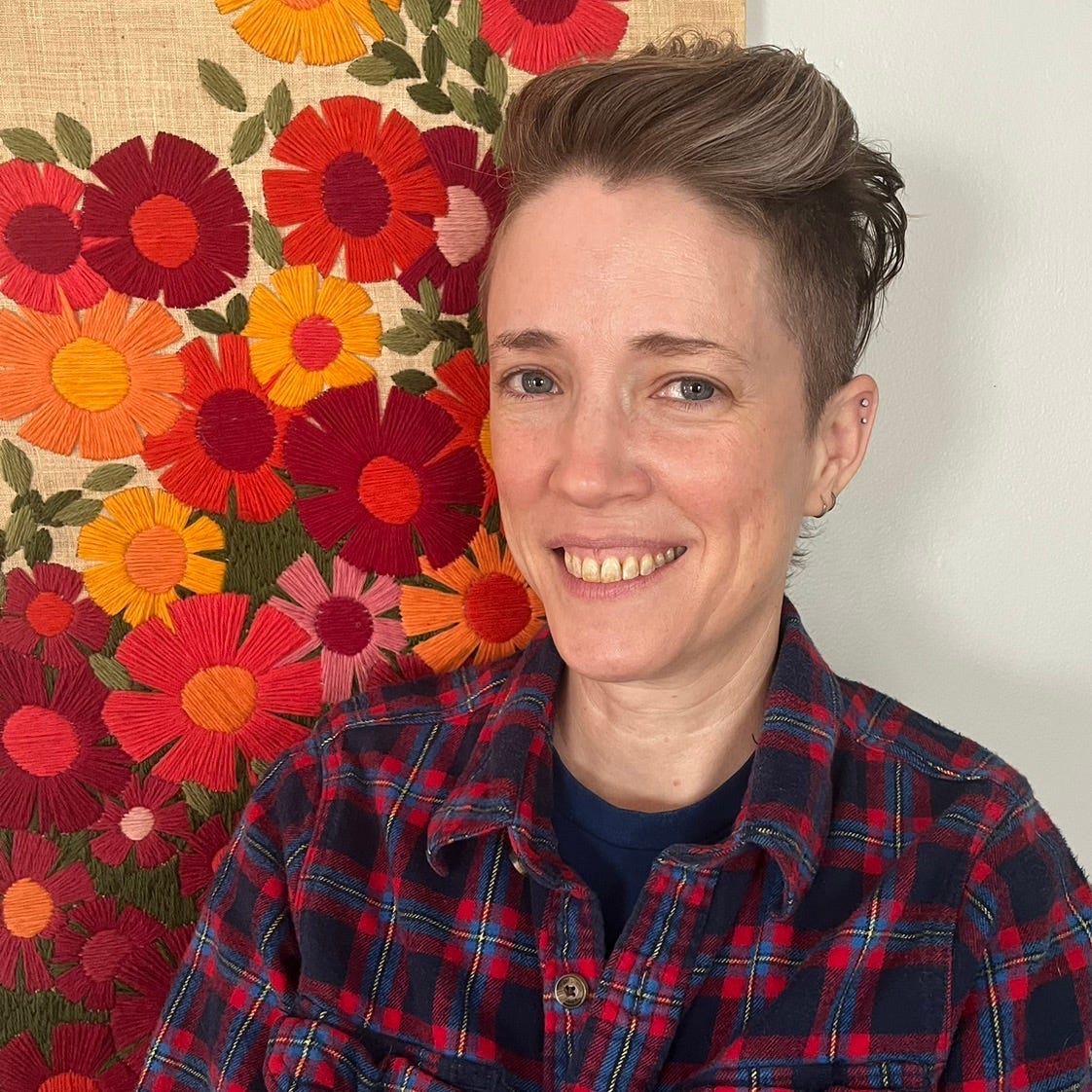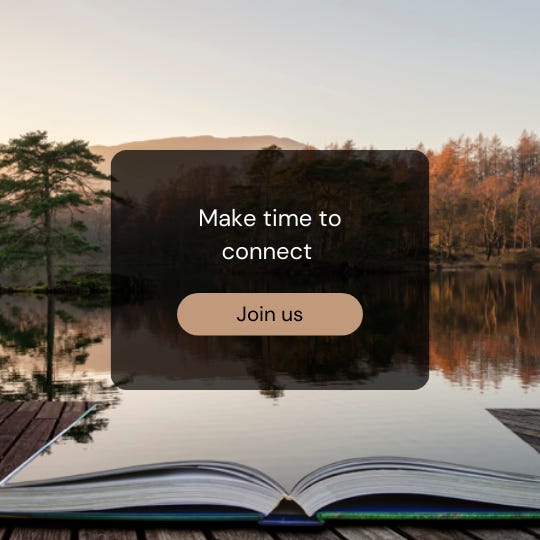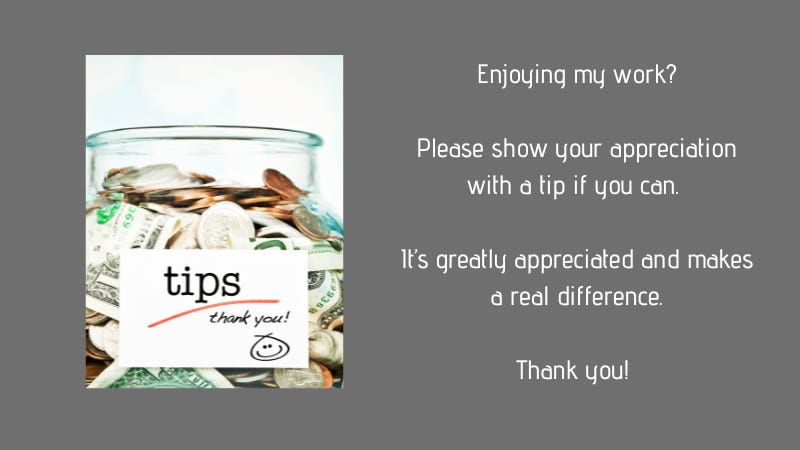Discovering Mindful Writers: Emily Conway
Wisdom and reflections from Emily's writing journey
Welcome to the September “Discovering Mindful Writers Q&A”. Each month, a guest writer answers the same seven questions about their writing life.
I am delighted to welcome this month. Emily writes A Thin Space, where she shares personal essays that explore attentive and intentional living in a way that brings readers closer to discovery, joy, and healing. It’s one of my favourite publications. Emily is one of the first people I connected with here on Substack and her words always resonate with me. We share many similarities in our lives but when I first read her work, I didn’t know that. It just spoke to me.
I hope you enjoy her answers to my questions. I find her question about what a nomad has to offer when writing about place very interesting. As someone who is prone to wander this is something I wonder about too. What do you think? Can people with no place they call home write with depth about the places they inhabit temporarily?
With love,
What does mindful writing mean to you?
I would not label myself as someone who practices mindfulness, although others certainly would. I have a years long meditation practice. I teach and provide space for others to learn to be with themselves and their lives in a way that brings healing. And my writing results from a continual, deep attention to myself and the world.
But the word “mindful” has always felt like a sticker I’ve slapped onto a visible part of me so that I make sense to others. The term feels skin deep, not one I can embody, although so many writers (including some fantastic ones here on Substack) clearly do. Their words and lives serve as invaluable companions to me on my own human journey. After searching for a way to describe myself to others, I came back to a word that I used to identify with Christianity, “contemplative.” In Latin, the word “con” means “with, together,” while the word “templum” designates a sacred space (think temple) or a broad, open space. For my purposes, the word contemplative means “being with the sacred in an open space.” I want to be “with” my life in the fullest sense. I also desire to see each person, including myself, as holy, inherently whole and good. And I have a visceral love for open spaces. They feel incredibly freeing, occasionally frightening, but always worth inhabiting.
To be a contemplative writer, then, is to be with the emotions, thoughts and bodily sensations that course through me each day, along with the experiences and people who often prompt them. It is to be immersed in this daily sacredness, to remember my own, and finally, to occupy the broad space, the wilderness, of what I don’t know, of possibility – then to write from this place.
How does a mindful writing practice fit into your wider mindfulness journey?
I’ve had a mindfulness, or contemplative, practice for much longer than I’ve had a consistent writing practice. I have always noticed and felt everything occurring outside of me, within me, and within others. I had no trouble being aware, I just didn’t know what to do with all of the input. Eventually, I decided that I was inherently wrong, and that if I could fix myself, I would not hurt anymore. I spent several decades working very hard at this decidedly, unmindful task, while struggling to keep my swamped self from drowning in one sensation after another.
Ironically, aside from prayer, the physical act of swimming became my first contemplative practice before I knew what that word, or mindfulness, meant. I learned to swim between my two pregnancies and after my body had ruled against any land based aerobic activity. In the pool, I had to move my arms and legs rhythmically. I had to breathe, I hoped, rhythmically. I couldn’t see anything but the bottom of the pool and the water line when I turned my head to gulp air. I couldn’t hear much either, thanks to the water’s muffling effect. The lack of sensory input, combined with steady movement gave me space to process all of that incoming noise. I swam for years before I discovered meditation, and I believe the first practice prepared me for the second. Swimming cleared the crammed space in my mind and body, while meditation gave me the tools to stop fixing and start being.
Meditation, therapy, Spiritual Companioning, and more hard internal work eventually led me to writing, my latest, and possibly most meaningful, contemplative practice. When I write, I try to express for readers my personal noticings in the clearest, most helpful way, while always maintaining the promise to myself of authenticity. I put words down in a particular order. I ponder: Am I leaving something out here? Am I avoiding something? Am I trying to present a tidy package when very little is ever neat? Am I writing for a particular emotional reaction? I change the words. I ponder again. All of this is meditative; all of it is contemplative.
What do you write? Essays, poetry, fiction, plays?
I write personal essays. That format seems most suited to my own never boring, internal life, my desire to find meaning in it, and to connect with others through it.
What drives you to write?
I believe I’ve always been a writer. I just didn’t have a voice, and therefore, the words stayed jumbled up in my head for years. My experiences of complex trauma left me without a self. I learned that if I kept everyone else happy, became whatever they needed, I would feel safe. No space existed to express my own thoughts, let alone write them down and show them to strangers or even read them myself. I wrote paragraphs of description, arguments, explanations in my head, but each time I tried to shift the words to the page, I could barely move the pen or look at what I’d written. The whole process seemed very dangerous and almost physically impossible.
Many writers (Jeannine Ouellette has written passionately about this subject) say that writing “saved my life.” I flip that sentence on its head and say, “I had to save my life so that I could write.” And I did. My drive to write comes from the simple fact that I can, and having spent so much of life mute, I have no intention of spending the rest of it that way. As I continue to move through and work with my life, I expect writing, the rescuing force inaccessible to me for so long, to be vital to my survival.
What stops you from writing?
Everything else. Two of my children attend college now, so I have a lot more time than I did a couple of years ago. But my youngest child is a senior in high school, deep into the process of looking for colleges, and starting to make the big shift from a teenager who lives with her parents, to a college student who lives a large portion of the year on her own. One of my jobs is to help her make the transition.
I also run an Airbnb and have a Spiritual Companioning practice. I lead retreats and facilitate various groups as well. In the midst of all this, I work to keep writing at the top of my priority list by practicing what does not come easy for me, setting boundaries and blocking time for particular tasks. I remind myself over and over that my own well-being, my writing, and my nearly grown child come first.
What do you aspire to achieve with your writing?
I want to become a better writer. I devote many hours a week to crafting my newsletter and then talking about it with my editor (aka my partner). I spent 10 years in English Literature classes, but I have never taken a creative writing course (I did participate in a recent workshop of Jeanine Ouellette’s, which was wonderful and very helpful). I would like to take courses and workshops to improve my writing and to practice looking at writing through a writer’s, rather than only a reader’s or a literature professor’s, eyes.
And, yes, I would love to write a book (or two) someday. I’m interested in what particular gifts those with complex trauma have to share, and how those might be useful during this time of deep destabilization and change. I’m also obsessed with place. I’ve moved many times. Wherever I’ve lived, I have always tried to make a place for myself and my family, as well as get to know the landscapes I inhabit. I want to spend more time pondering what a nomad like myself has to contribute to narratives about place. And finally, I long for my writing to connect with readers. I want them to read my words and feel seen, heard, understood, more hopeful. I want them to find a companion in my writing.
How do you write? Are you a planner or do you just start writing from an idea and let it lead you?
I’m not a natural planner. I love to go with the flow, except that I can’t go with the flow, do my various jobs, and stay sane. Nevertheless, while I do block out time to write, I do not, at this point, plan my topics. I just listen and pay attention to what’s happening in and around me throughout my days. I’m mindful and contemplative. Almost always, a topic appears, usually attached to a personal story. This process is a waiting game, though. Occasionally, nothing shows up, or what does surface has no weight to it. Then I panic a little, but eventually, I realize that I’m out in the wide-open contemplative space. I remember that I love it here. And I’m always surprised and usually delighted with the words that come from that sacred space.
Thanks so much for your time and sharing your insights and inspirations, Emily.
Next month’s guest is
who writes Yoga Living 50 and Beyond.Read previous interviews in the series here.
Thank you for reading The Mindful Writer. If you enjoy my posts and would like to commit to a slower, more mindful writing practice, please consider becoming a supporter for only £5 a month.
Alternatively, a one-time donation will help me continue the hard work behind bringing these posts to you.










This is wonderful. So good to get to know you a little better, Emily!
I really appreciate how you explore that word 'mindful' and go more deeply into what is true for you as a human and a writer. "Contemplative writing" is a beautiful practice, and you have given that phrase such a full rendering here, like a Monet painting with many shades of nuance. I look forward to reading more of your work.
So wise! I love your way of understanding the word 'contemplative', Emily - I am going to reflect on this. And swimming is definitely a contemplative practice for me too.